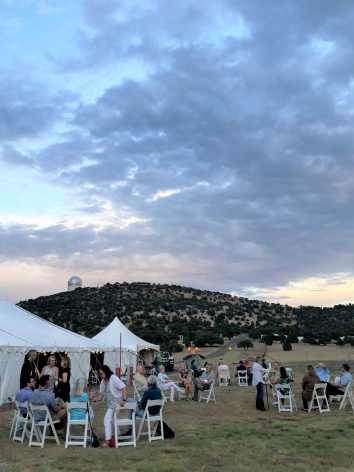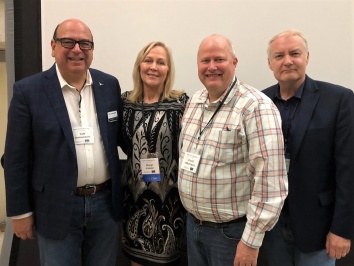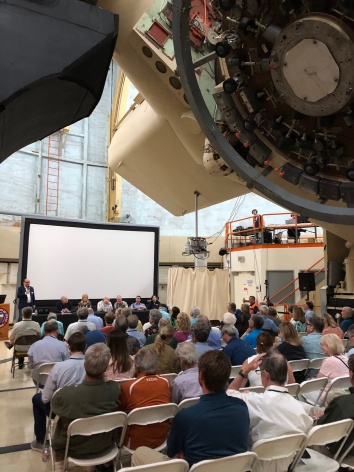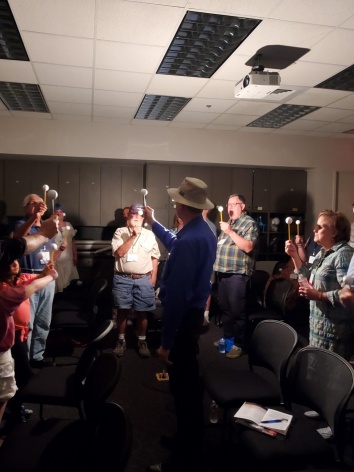
Board of Visitors members enjoying dinner and refreshments at dusk. The Hobby-Eberly Telescope is visible in the background. Credit: Cara Arlauskas/McDonald Observatory.
30 August 2023
The 2023 Board of Visitors Summer Meeting took place July 14-15 at McDonald Observatory in Fort Davis, Texas.
Over two hundred and fifty Board of Visitors members and guests gathered at the Observatory to learn about cutting-edge science, enjoy VIP access to the telescopes, and connect with friends - old and new - under the wide-open skies of West Texas.
At the event, the Board of Visitors welcomed five new members. Thank you for joining us! And thank you to all who attended the event. We were delighted to see so many of you in person.
About the Board of Visitors
The Board of Visitors is one of The University of Texas at Austin’s oldest and most respected donor groups. Members live across Texas and beyond, united by a love of and commitment to the field of astronomy.
Over time, Board of Visitors members have helped us accomplish great things through their generous contributions. This ranges from funding chairs, professorships, and graduate student fellowships, to helping with private contributions to build the magnificent Hobby-Eberly Telescope, the Hobby-Eberly Telescope Dark Energy Experiment, the Frank N. Bash Visitors Center, and much more.
To learn about ways to support the Observatory, visit mcdonaldobservatory.org/support.
Connecting with the Power of Spectroscopy
The theme of this summer’s meeting was “The Power of Spectroscopy.” With spectroscopy, the light of stars and galaxies is broken into a spectrum, with the amount of light at different wavelengths indicating how energy is absorbed, emitted, or scattered by different substances. Much of what we measure about stars, galaxies, and other components of the universe is done with spectroscopy.
Through science talks and discussion groups, meeting attendees connected with the fascinating science, recent accomplishments, and upcoming developments in spectroscopic research and instrumentation underway at McDonald Observatory and The University of Texas Department of Astronomy.
Science Talks
Studying the Cosmic Web Directly, for the First Time: The Unique Power of the HET and VIRUS
“Detection of the Cosmic Web is one of the holy grails of astronomy.” – Gary Hill
The galaxies in our Universe are connected to one another by filaments of primordial gas and dark matter. This structure, known as the Cosmic Web, is notoriously difficult to detect. Gary Hill, research professor and chief astronomer at McDonald Observatory, shared how the Hobby-Eberly Telescope and its Visible Integral-Field Replicable Unit Spectrograph (VIRUS) are uncommonly capable at detecting the Cosmic Web and how their observations are leading to new insights.
Gas Dancing in the Starlight: Revealing the Hidden Secrets of the Orion Nebula in the Infrared with IGRINS at McDonald Observatory
“IGRINS is coming back to McDonald in 2024. Understandably, I’m very excited.” – Kyle Kaplan
After visiting other observatories around the world, the Immersion GRating INfrared Spectrometer (IGRINS) instrument will return to its home base at McDonald Observatory next year. Research Fellow Kyle Kaplan, explained how IGRINS helps astronomers like himself learn about how stars form and interact with their surroundings.
Our Chemically Diverse Milky Way
“If you want to study how the Milky Way formed, evolved, and is structured, you have to get pretty clever.” - Catherine Manea
Though the Milky Way is our home Galaxy, much of it is still unknown to us. That’s because we live inside of it and are unable to view it from an outsider’s perspective. Ph.D. Candidate Catherine Manea shared how astronomers are overcoming this obstacle by studying the chemical compositions of stars. In doing so, they are uncovering the history and present-day structure of our Galaxy.
Science Discussion Groups
The Power of the New VIRUS2 Instrument for the Harlan J. Smith Telescope
Research Scientist Hanshin Lee and Chief Astronomer Gary Hill discussed the development of the new Visible Integral-Field Replicable Unit Spectrograph instrument (VIRUS2), which will soon be installed on the Harlan J. Smith Telescope. It will gather spectroscopic data for a broad range of wavelengths in a particularly large patch of sky, opening up new areas in the study of nearby galaxies.
Opening the Eyes of Students with Summer Research Projects at McDonald Observatory
Steven Janowiecki, Hobby-Eberly Telescope science operations manager and resident astronomer, discussed the summer student research projects he has mentored over the years as part of a partnership with The University of Texas Rio Grande Valley. Through these projects, students gain a strong foundation in how to do astronomy research and experience a lasting impact on their career interests and trajectories.
The Wootton Center for Astrophysical Plasma Properties: Disrupting Astronomy
Professor Don Winget shared the work underway at The University of Texas at Austin’s Wootton Center. By creating cosmic conditions in the lab (for example, the interior of the sun), the Center is able to test long-held astronomical theories. This work, paired with powerful new instruments coming online, is ushering in a new, disruptive era of astronomical discovery.
Eclipses of Texas Expand McDonald Observatory Outreach
Over the next year, Texans will have an opportunity to experience two solar eclipses. An annular solar eclipse will cross the state on October 14, 2023, and a total solar eclipse will follow on April 8, 2024. Katie Kizziar, assistant director for education and outreach, discussed the science of eclipses and ways the McDonald Observatory is helping communities prepare.

Board of Visitors members enjoying dinner and refreshments at dusk. The Hobby-Eberly Telescope is visible in the background. Credit: Cara Arlauskas/McDonald Observatory.

From left to right: Taft Armandroff (McDonald Observatory director), Sheryl O’Briant (Board of Visitors chair), David Vanden Bout (College of Natural Sciences dean), and Volker Bromm (Astronomy Department chair) inside the 107-inch Harlan J. Smith Telescope. Credit: Cara Arlauskas/McDonald Observatory.

Astronomers shared their research at science talks held in the 107-inch (2.7-meter) Harlan J. Smith Telescope. Credit: Cara Arlauskas/McDonald Observatory.

Board of Visitors members learn about eclipses in the science discussion group Eclipses of Texas Expand McDonald Observatory Outreach. Credit: Emily Howard/McDonald Observatory.